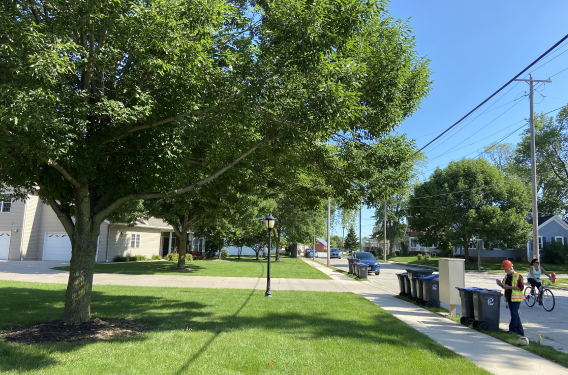Urban Forest Inventory and Analysis (UFIA)
The Urban Forest Inventory and Analysis (UFIA) program in Wisconsin is a partnership between the USDA Forest Service and the Wisconsin DNR that has established 1,300 permanent plots across the state’s urban areas. Tree and land cover data are collected at each of these plots, enabling the estimation of urban forest diversity, growth, mortality and extent across a wide area. Crucially, these plots are found on all ownership types, not just publicly managed land, and thus more fully represent the entire urban forest. Plots are revisited every seven years. Additionally, these data are used to identify and track the environmental, economic and social benefits and services provided by urban trees.
Additional information can be found in an FAQ document, which is particularly valuable for landowners whose permission for land access has been requested.
Results
Results are currently available for the cities of Milwaukee and Madison. Results for statewide urban areas will become available in 2026.
- Milwaukee's Urban Forest in a Nutshell: An infographic summarizing results for Milwaukee
- Madison's Urban Forest in a Nutshell: An infographic summarizing results for Madison
- My City's Trees: A tool which summarizes UFIA data by theme (such as watersheds, building age, or population density)
- Urban Forest Stats: A tool which allows customized searches and summaries
- Urban FIA DataMart: A platform where raw data can be downloaded
Contact Dan Buckler with questions or data requests.
History of FIA
Since 1930, the Forest Service has been surveying, analyzing and reporting on the health and productivity of America's forests, including those in Wisconsin. Known as Forest Inventory and Analysis, this Forest Service program works in partnership with the nation's state forestry agencies, universities and nongovernmental organizations to serve as the nation's forest census.
Through the rest of the 20th century, urban forests were not covered by an inventory and monitoring system like rural forests. However, an initiative in the federal 2014 Farm Bill called for an expansion of the FIA program to include sampling of the nation's urban forests. With experience gained from past urban pilot studies, FIA teamed up with i‑Tree to implement an annualized inventory of trees in urban settings.
The Forest Service has been focused on major metropolitan areas, though some states like Wisconsin have chosen to sample data across all urban areas, not just their largest ones. Plots were first established in the Milwaukee and Madison metro areas in 2015 before expanding to urban forests throughout Wisconsin the following year.
Wisconsin Urban Landowner Survey
A complementary project to UFIA is the Wisconsin Urban Landowner Survey. Because almost 70% of Wisconsin’s residents live in urban areas, it is important to assess landowners’ interest in local trees. In 2017, a team of state and national entities sent 6,000 surveys to private residential landowners in the Green Bay, Madison, Milwaukee and Wausau urban areas.
More than 1,700 landowners responded to the survey, primarily single-family homeowners, providing insights about their attitudes toward tree care, concerns about tree risks and their tree management choices such as pruning and planting.
In addition to piloting an urban form of the long-running National Woodland Owner Survey (NWOS) with the Forest Service, the Wisconsin survey is providing valuable insights for Wisconsin’s urban communities. Urban forestry programs and community tree care groups will be able to use information from the survey to better understand the perspectives and needs of urban homeowners to help them take steps to be active stewards of their trees.
Read the full report, Communicating More Effectively about Urban Forestry.

